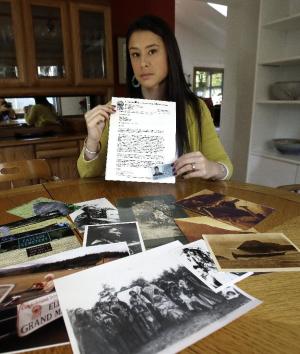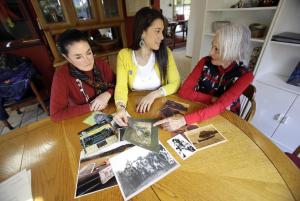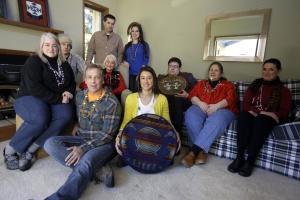PORTLAND, Ore. (AP) — Mia
Prickett's ancestor was a leader of the Cascade Indians along the
Columbia River and was one of the chiefs who signed an 1855 treaty that
helped establish the Confederated Tribes of the Grand Ronde in Oregon.
But the Grand
Ronde now wants to disenroll Prickett and 79 relatives, and possibly
hundreds of other tribal members, because they no longer satisfy new
enrollment requirements.
Prickett's
family is fighting the effort, part of what some experts have dubbed
the "disenrollment epidemic" — a rising number of dramatic clashes over
tribal belonging that are sweeping through more than a dozen states,
from California to Michigan.
"In
my entire life, I have always known I was an Indian. I have always
known my family's history, and I am so proud of that," Prickett said.
She said her ancestor chief Tumulth was unjustly accused of
participating in a revolt and was executed by the U.S. Army — and hence
didn't make it onto the tribe's roll, which is now a membership
requirement.
The prospect of losing her membership is "gut-wrenching," Prickett said.
"It's like coming home one day and having the keys taken from you," she said. "You're culturally homeless."
View gallery

Mia Prickett sits at a table with a collection of family photos and holds her Confederated Tribe of …
The enrollment battles come
at a time when many tribes — long poverty-stricken and oppressed by
government policies — are finally coming into their own, gaining wealth
and building infrastructure with revenues from Indian casinos.
Critics
of disenrollment say the rising tide of tribal expulsions is due to
greed over increased gambling profits, along with political in-fighting
and old family and personal feuds.
But
at the core of the problem, tribes and experts agree, is a debate over
identity — over who is "Indian enough" to be a tribal member.
"It
ultimately comes down to the question of how we define what it means to
be Native today," said David Wilkins, a political science professor at
the University of Minnesota and a member of North Carolina's Lumbee
Tribe. "As tribes who suffered genocidal policies, boarding school laws
and now out-marriage try to recover their identity in the 20th century,
some are more fractured, and they appear to lack the kind of common
elements that lead to true cohesion."
Wilkins,
who has tracked the recent increase in disenrollment across the nation,
says tribes have kicked out thousands of people.
View gallery

Mia Prickett, middle, shares a collection of family photos with great aunt's Marilyn Portwood, r …
Historically, ceremonies
and prayers — not disenrollment — were used to resolve conflicts because
tribes essentially are family-based, and "you don't cast out your
relatives," Wilkins said. Banishment was used in rare, egregious
situations to cast out tribal members who committed crimes such as
murder or incest.
Most tribes
have based their membership criteria on blood quantum or on descent from
someone named on a tribe's census rolls or treaty records — old
documents that can be flawed.
There
are 566 federally recognized tribes and determining membership has long
been considered a hallmark of tribal sovereignty. A 1978 U.S. Supreme
Court ruling reaffirmed that policy when it said the federal government
should stay out of most tribal membership disputes.
Mass
disenrollment battles started in the 1990s, just as Indian casinos were
establishing a foothold. Since then, Indian gambling revenues have
skyrocketed from $5.4 billion in 1995 to a record $27.9 billion in 2012,
according to the National Indian Gaming Commission.
Tribes have
used the money to build housing, schools and roads, and to fund tribal
health care and scholarships. They also have distributed casino profits
to individual tribal members.
View gallery

Mia Prickett, seated on the floor holding a Confederated Tribe of Grande Ronde drum, poses for a pho …
Of the nearly 240 tribes
that run more than 420 gambling establishments across 28 states, half
distribute a regular per-capita payout to their members. The payout
amounts vary from tribe to tribe. And membership reductions lead to
increases in the payments — though tribes deny money is a factor in
disenrollment and say they're simply trying to strengthen the integrity
of their membership.
Disputes
over money come on top of other issues for tribes. American Indians have
one of the highest rates of interracial marriage in the U.S. — leading
some tribes in recent years to eliminate or reduce their blood quantum
requirements. Also, many Native Americans don't live on reservations,
speak Native languages or "look" Indian, making others question their
bloodline claims.
Across the nation, disenrollment has played out
in dramatic, emotional ways that left communities reeling and cast-out
members stripped of their payouts, health benefits, fishing rights,
pensions and scholarships.
In Central California, the Picayune
Rancheria of the Chukchansi Indians has disenrolled hundreds. Last year,
the dispute over banishments became so heated that sheriff's deputies
were called to break up a violent skirmish between two tribal factions
that left several people injured.
In Washington, after the
Nooksack Tribal Council voted to disenroll 306 members citing
documentation errors, those affected sued in tribal and federal courts.
They say the tribe, which has two casinos but gives no member payouts,
was racially motivated because the families being cast out are part
Filipino. This week, the Nooksack Court of Appeals declined to stop the
disenrollments.
And in Michigan, where Saginaw Chippewa membership
grew once the tribe started giving out yearly per-capita casino
payments that peaked at $100,000, a recent decline in gambling profits
led to disenrollment battles targeting hundreds.
The Grand Ronde,
which runs Oregon's most profitable Indian gambling operation, also saw a
membership boost after the casino was built in 1995, from about 3,400
members to more than 5,000 today. The tribe has since tightened
membership requirements twice, and annual per-capita payments decreased
from about $5,000 to just over $3,000.
Some members recently were
cast out for being enrolled in two tribes, officials said, which is
prohibited. But for Prickett's relatives, who were tribal members before
the casino was built, the reasons were unclear.
Prickett and most
of her relatives do not live on the reservation. In fact, only about 10
percent of Grand Ronde members do. Rather, they live on ancestral
lands. The tribe has even used the family's ties to the river to fight
another tribe's casino there.
Grand Ronde spokeswoman Siobhan
Taylor said the tribe's membership pushed for an enrollment audit, with
the goal of strengthening its "family tree." She declined to say how
many people were tabbed for disenrollment.
But
Prickett's family says it has been told that up to 1,000 could be cast
out, and has filed an ethics complaint before the tribal court. They say
the process has been devastating for a family active in tribal arts and
events, and in teaching the language Chinuk Wawa.
"I
have made a commitment to both our language and our tribe," said Eric
Bernardo, one of only seven Chinuk Wawa teachers who also faces
disenrollment. "And no matter what some people in the tribe decide, I
will continue to honor that commitment."









